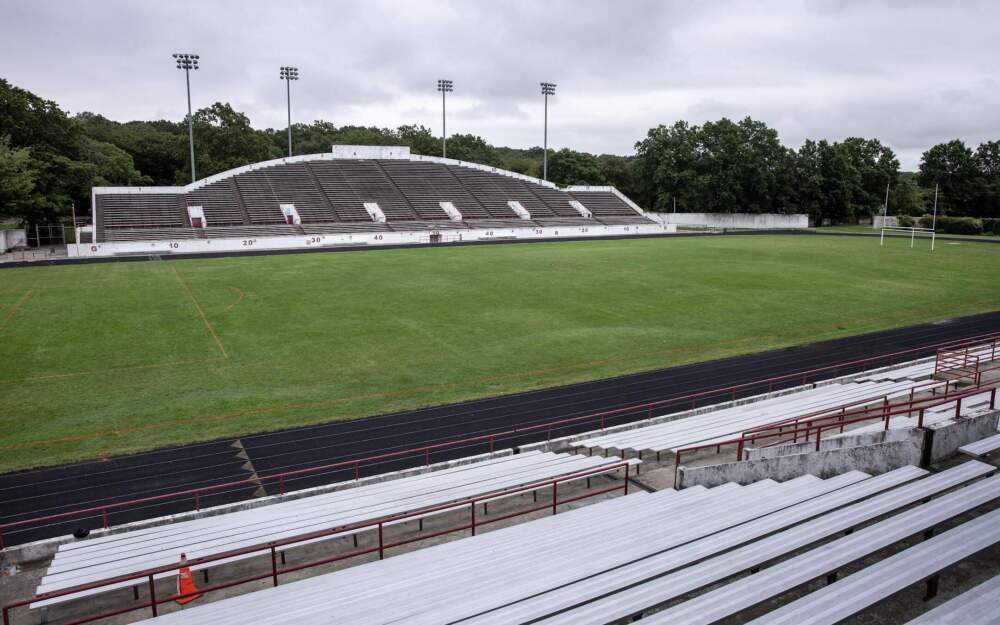Advertisement
Judge rules in favor of White Stadium renovation, pro soccer team plan

A Suffolk Superior court judge on Friday ruled against plaintiffs who sought to block a plan to renovate White Stadium, handing a victory to the City of Boston and Boston Unity Soccer Partners, which plans to bring a women’s professional soccer team to the city by 2026.
The lawsuit— brought by the Emerald Necklace Conservancy and 21 residents— sought an injunction to stop demolition and construction work at the stadium inside Franklin Park. But Judge Sarah Ellis denied their motion in a decision released late in the day.
“Upon consideration of the arguments, pleadings, and relevant legal standards as discussed herein, Plaintiffs’ Motion for Temporary Restraining Order and Preliminary injunctions is denied,” read Ellis’s decision. “Plaintiff’s Motion for Lis Pendens (a pending lawsuit notification) is also denied.”
Judge Ellis ruled that the public would gain more access with the proposed plan, and that the use was consistent with the will of George Robert White, whose last wishes were to leave money to the city for the benefit of its residents — including purchasing the land and building White Stadium in the 1940s for the benefit of Boston’s schoolchildren.
“Plaintiffs contend the terms of the will prohibit the city from renovating White Stadium with a private partner, limiting public access to any portion of the Stadium property, and/or leasing any portion of the Stadium property to a private entity violate the terms of the will,” she wrote. “However, the renovation of White Stadium pursuant to a public-private partnership — which will bring a professional women’s soccer team to Boston and prioritizes BPS (Boston Public Schools) and public access — appears consistent with the will.
“The private benefits are not primary, but instead are subsidiary to White Stadium’s public purposes,” she continued.
Ellis also pointed out that the will contemplates leases of White Fund property, and the only requirement stipulated is that such leases be re-evaluated every 10 years.
“The proposed lease agreement between the city and [Boston Unity] is for a ten-year term,” she reasoned.
On the injunction, plaintiffs had argued that it was needed as irreparable harm would occur if the stadium was allowed to be demolished and leased, changing the nature of the stadium and hurting abutters.
“I am not persuaded,” she wrote.
Dorchester’s Louis Elisa, a plaintiff in thee lawsuit, said he was very disappointed in the ruling.
“I view the failure of the court to take the concerns of possible harm and displacement which would occur as being similar to the Dred Scott decision wherein our rights as Black citizens are not worthy of serious consideration or respect. Nothing has changed in Boston,” says Elisa, of the Garrison Trotter Neighborhood Association.
Emerald Necklace Conservancy Director Karen Mauney-Brodek urged the city to abandon the plan, despite the win in court.
“We urge the City to abandon this flawed privatization scheme that is not supported by a single neighborhood association. Instead, support the stadium and the park with the $50 million in taxpayer funds they’ve already identified,” she said. “We will continue to stand up for the students of Boston, who deserve a state-of-the-art public White Stadium and should not have to yield to the demands of for-profit investors to get it.”
But in a statement, Boston Unity Soccer Partners said they were happy that the residents of Boston would be able to move ahead with a groundbreaking public-private partnership — and they urged Conservancy and others to join them in planning for the stadium and the soccer team.
“We are grateful that today’s ruling demonstrates the court’s understanding that the communities around Franklin Park and White Stadium should not have to wait any longer for the decades of neglect and underuse to be addressed,” the wrote in the statement. “We are confident that there is no legal basis for this lawsuit and that this public, private, community partnership can be realized.
“We invite the Emerald Necklace Conservancy to participate with us and welcome the opportunity to collaborate,” they concluded.
The city plans to use municipal bond borrowing to finance $50 million in construction costs, while Boston Unity has said it would pitch in $30 million for its portion. The city would renovate the East Grandstand and build out a student-athlete hub that includes locker rooms, exercise facilities, and places to hang out. Boston Unity would renovate the West Grandstand and locker rooms, as well as the Grove piazza just east of the stadium. Boston Public Schools and the George Robert White Foundation would retain ownership.
WBUR and the Dorchester Reporter have a partnership in which the news organizations share resources to collaborate on stories. This story was originally published by the Dorchester Reporter.